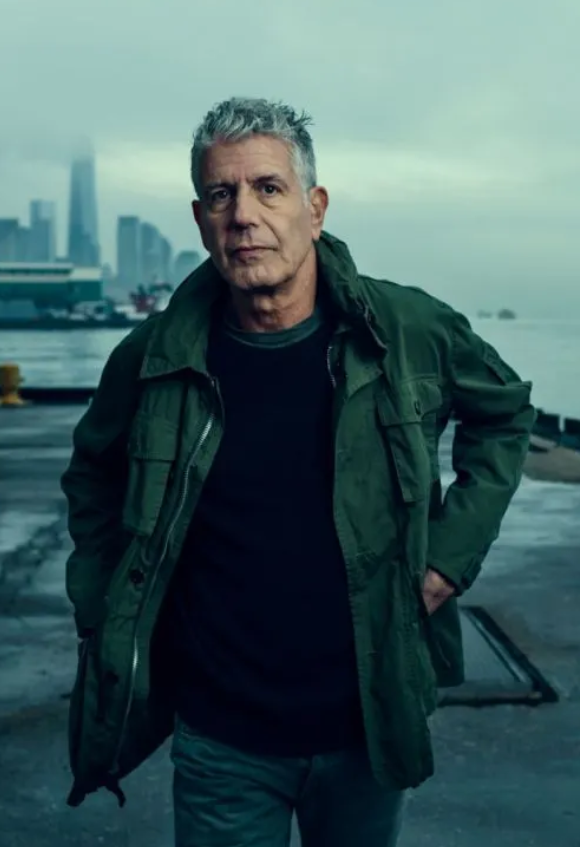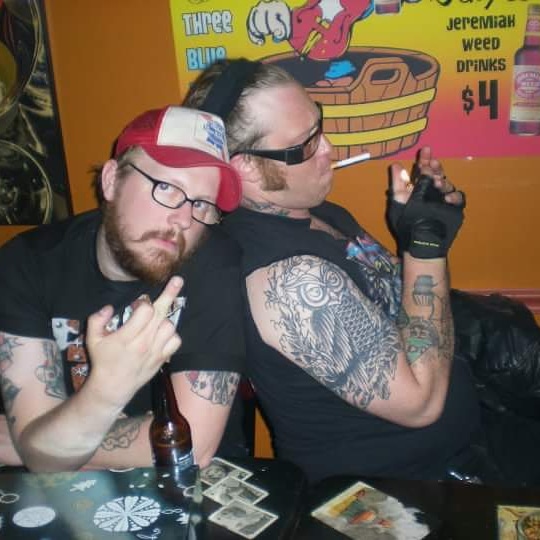THE VALUE OF GOOD A GOOD KNIFE
CONTENT WARNING: Suicide, Alcoholism, Divorce
September is Suicide Prevention Month, so I wanted to dust off this piece I wrote about my own struggles with suicidal ideation after Anthony Bourdain’s death. I’ve made some adjustments to it, so if you read the original this is a little longer. It’s not necessarily an easy read, but I’m proud of it. <3

Anthony Bourdain, in his 2000 memoir Kitchen Confidential, said the only knife you really need is, “…one good chef’s knife, as large as is comfortable for your hand.” In the book, Bourdain is railing against that ubiquitous block of knives that first finds itself on the counter of your post-college apartment and then seems to move with you in perpetuity as even as your life outgrows the makeshift nature of a young person’s first home.
I still had one of those blocks in my kitchen when my marriage was coming apart. Working opposite schedules, my wife and I spent most of our time writing the playbook for “Netflix and ignore your problems.” Each red envelope (this was before the streaming empire) was a conversation we didn’t have to have. And many of those envelopes contained episodes of No Reservations, Bourdain’s popular television series where he traveled to various cities and immersed himself not only in their cuisine, but their culture.
The show, the book, and the man behind them both taught me to seek food as a form of healing and in that last year of marriage, cooking became the final thing that connected me and my wife. Food was a bridge to the compassion and togetherness that by that point had been mostly eroded from our relationship by my undiagnosed mental illness and my untreated alcoholism, the former of which I wasn’t yet aware of and the latter of which I was uninterested in giving up. When we had time for intimacy at all, which was rare — I was a bar worker, she was a baker, so our schedules were at opposite poles — we would cook and we would share Bourdain’s journey.
Somewhere in all of this escapist binge watching, I decided to do what Bourdain had told us all years before in Kitchen Confidential: I ditched the block of knives and searched for a decent chef’s knife. I can remember researching the purchase for weeks. I read reviews online of knives in my price range, asked friends whose cooking I most enjoyed which knives they used, and handled cutlery in the cooking sections of Target and TJ Maxx. Eventually I settled on a KitchenAid knife with an oxblood red grip and a good blade. It wasn’t a finely honed piece of Japanese steel or a perfectly balanced example of German engineering, but it wasn’t cheap. The perfect first chef’s knife for a blue collar kid trying to hold onto something.
My job at the time required that I sometimes make sandwiches and on slower nights I would stand in the back, terrible knife that was probably rescued from one of the aforementioned ubiquitous knife blocks, and teach myself how to dice, chop, and mince.
It was a clumsy tool, but with it I learned to be more comfortable with my own knife. So when I went home, I could proudly grip that oxblood handle and dice, chop, and mince with expanding skill and confidence. Onions bowed to my will, fruit fell into fearful symmetry that would have made William Blake weep, celery fell to pieces before the might of my blade. The more time I spent with the knife, the more it became an extension of me. It was just large enough to feel comfortable in my hand, and it became the only knife I needed, just like Anthony said.
It was very comfortable in my hand the day I pondered taking life with it.
You see, the red envelopes stopped coming fast enough and my wife and I eventually had all the conversations they’d helped us avoid. Most of which were about all the damage I had done.
There’s something particularly haunting about hearing all the ways you’ve hurt someone you love. And more haunting still to know you’ve been powerless to stop it. That the only way you can stop hurting them is to push them away, because you can see the whole awful puzzle of yourself laid out on the table but can’t for the life of you figure out how to piece it all together yet. That feeling snakes its way into your brain and lives there forever. These days, it lives as a lesson. But at the time, it was more like a hurricane.
The year my wife and I separated was largely a blur that I spent frequently drunk. And not the sort of cool, barfly drunk that Anthony Bourdain often embodied for me. But the “not knowing how you got home, no-showing at work, drinking till you black out in some park and your friends think you’re probably dead” kind of drunk. An addict’s drunk. A monstrous drunk. And at the end of that year, it was only getting worse. And I thought the only way to fix it was to leave. For good.

It’s hard to know what makes a person decide to finally choose suicide. Even if there’s a note, you still wonder if the note conveys the truth or if it was a sweet lie written in the hope that it would help ease the pain for the people who would have to read it. I didn’t write a note at all. I didn’t write much of anything in those days. I mostly just drank and told people I was a writer. In truth, I was scared to write, because writing represented the future and the future felt impossible.
But as I stood there, in the sunlit kitchen I’d once shared with my wife, now shockingly empty and void of life, I finally peeled back the fear and looked forward, facing the hard journey before me or the ending I so desperately craved in that moment.
The knife was beginning to feel uncomfortable in my hand in my hand. I gripped it so tight my hand turned the same color as the handle. Sweat formed on my palm, even though the rest of me was ice cold.
I tried to imagine the faces of the people who would never see this coming, the friends and coworkers and family members who thought I was fine, because I’d become so adept at hiding. I imagined my parents at my funeral, imagined my mother crying and my father trying not to since he had to focus so much of his energy on consoling her. I saw my dog, a wild as hell rescue that had wandered into the bar one night and had refused to leave my side, beside my dead body, lonely and confused.
I stood there even longer, time itself melting away around me, and began to imagine admitting that I needed help. I saw friends I hadn’t even met yet, nameless faces embracing me and telling me it would be okay. I saw a life without alcohol—though I would struggle for many years after this to achieve it. I saw the lives I could still lead stretch out before me like so many pages of so many unwritten books.
The knife no longer felt comfortable in my hand. It felt ungrateful.
As I write this, I’m reminded of one particularly garish sequence from No Reservations in which the Kalahari bushmen of Namibia feed Bourdain a meal consisting of an omelet cooked in hot sand and a bit of roasted warthog anus he’s certain still contains feces. He describes it as the worst meal of his life, but never lets on to the bushmen that he is anything less than extremely grateful for the food. I’ve thought about that moment a lot in the years since the man took his own life, and what it tells us about what kind of man Anthony Bourdain truly was, what depths of respect he possessed.
Suicide isn’t the good choice, but it is a brutally honest one. And when you’re an addict, honesty is like mother’s milk. Because to be an addict means to lie to everyone. You lie to your partner, your family, your friends, your boss, and most of all, to yourself. For years, I’d spun a tale of multiple lies, a one-man show where every character was a healthy version of me — a funny, open, loyal friend, a strong and present lover, a loving son, a fun drinking buddy — but in that moment in that sunlit kitchen, I was no longer any of those people. I was just me, raw, and literally naked, and exposed.
I put the knife down and made a choice.
I decided I would keep living and I think I have to thank Anthony Bourdain for that. Because more than helping me learn to love food, more than teaching me to travel like a local, and even more than showing me the value of a good knife, Bourdain showed me the power of being honest with yourself and the world and the good it can accomplish if you do.
The knife sat, cold and powerless on the kitchen floor. My dog curled up next to me. All three of us stayed there till the sun went down.
I can’t say for certain how long after that it took me to pick up a pen again. But I can tell you that once I decided that the knife Anthony Bourdain encouraged me to buy was only meant for dicing, chopping, and mincing and not for showing myself my own blood, I made the choice to face my mental illness. I quit my job, I moved to Chicago, and I stopped being afraid to write.
Anthony Bourdain was never afraid to write. He wrote everything he felt — about food, yes, but also about what it meant to be an informed and compassionate citizen of the world. And with his words he taught so many of us how to see the world differently as well.
I don’t know what demons were haunting him, what lies he told himself or others in his final days, or why he decided to make the choice he did. But I know when he was here, he never shied away from owning his mistakes, never stopped challenging himself, and always stood up for the people who needed him most.
Even though I’ll never get the chance to tell him, I was one of those people.
Thanks Tony.